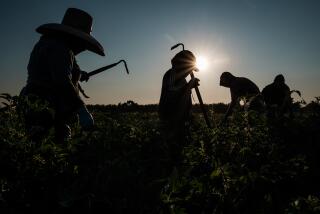Florida Moves to Aid Migrant Workers
- Share via
IMMOKALEE, Fla. — Gov. Jeb Bush signed legislation Friday that strengthened protections for as many as 300,000 migrant farm workers harvesting crops in Florida.
The law provides the workers, many of them Mexicans, with better protections against pesticides and increases the penalties against contractors who violate farm labor laws. It also revives a dormant commission to monitor farmworkers law.
Also, employers must inform workers about agricultural pesticides in a language they understand, and contractors are now prohibited from price-gouging farmworkers for essential items such as food, water and housing.
“Successful enforcement of these protections will ensure better living and working conditions for many who are a vital component of Florida’s second-largest industry and who contribute so much to our economy,” Bush said at a ceremony in this rural town about 100 miles northwest of Miami.
The cost to register as a farm labor contractor increases from $75 to $275, and penalties against contractors who violate labor laws increase from $1,000 to $2,500.
United Farm Workers of America spokesman Marc Grossman said the law would only be as good as its enforcement.
“You can have good laws, but if they are not enforced, what good are they?” Grossman asked. He said that California had the strictest laws concerning farmworkers but that there had been inconsistent enforcement.
Grossman said Florida needed to give its farmworkers the right to unionize.
“That’s the way you make fundamental change happen for workers,” he said. “Because then the workers can do it themselves and they don’t have to worry about a government agency.”
The Department of Agriculture will spend $300,000 to hire workers who will regulate the newly required pesticide notification, Bush said. The higher contractor fees will fund other aspects of the bill.
For the 50 farmworkers and organizers who attended the signing, the bill represents a first step toward better living and working conditions for some of America’s poorest workers.
“It’s about respect. It’s about a safe food supply,” said Barbara Mainster, the executive director of the Redlands Christian Migrant Assn.
More to Read
Sign up for Essential California
The most important California stories and recommendations in your inbox every morning.
You may occasionally receive promotional content from the Los Angeles Times.










